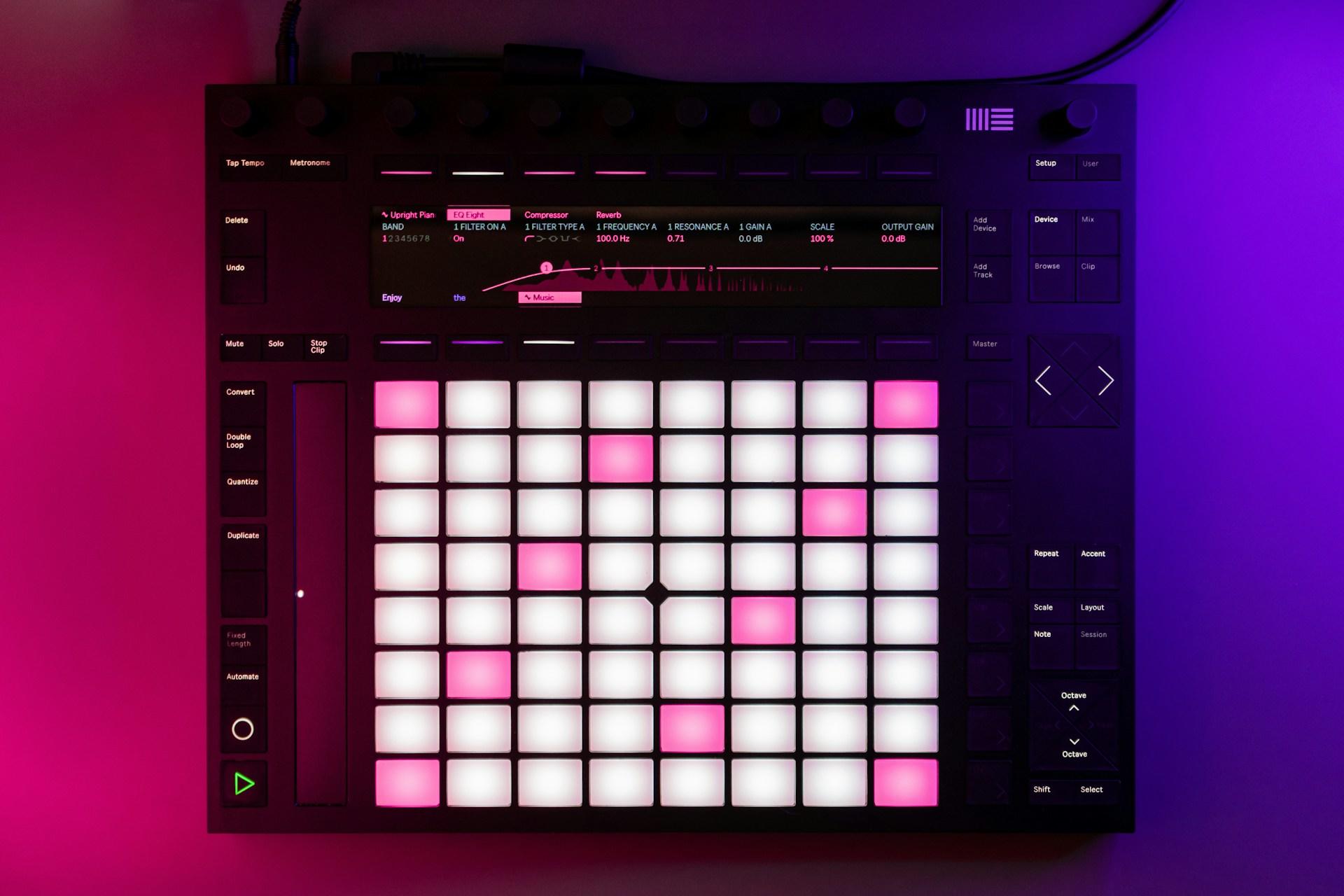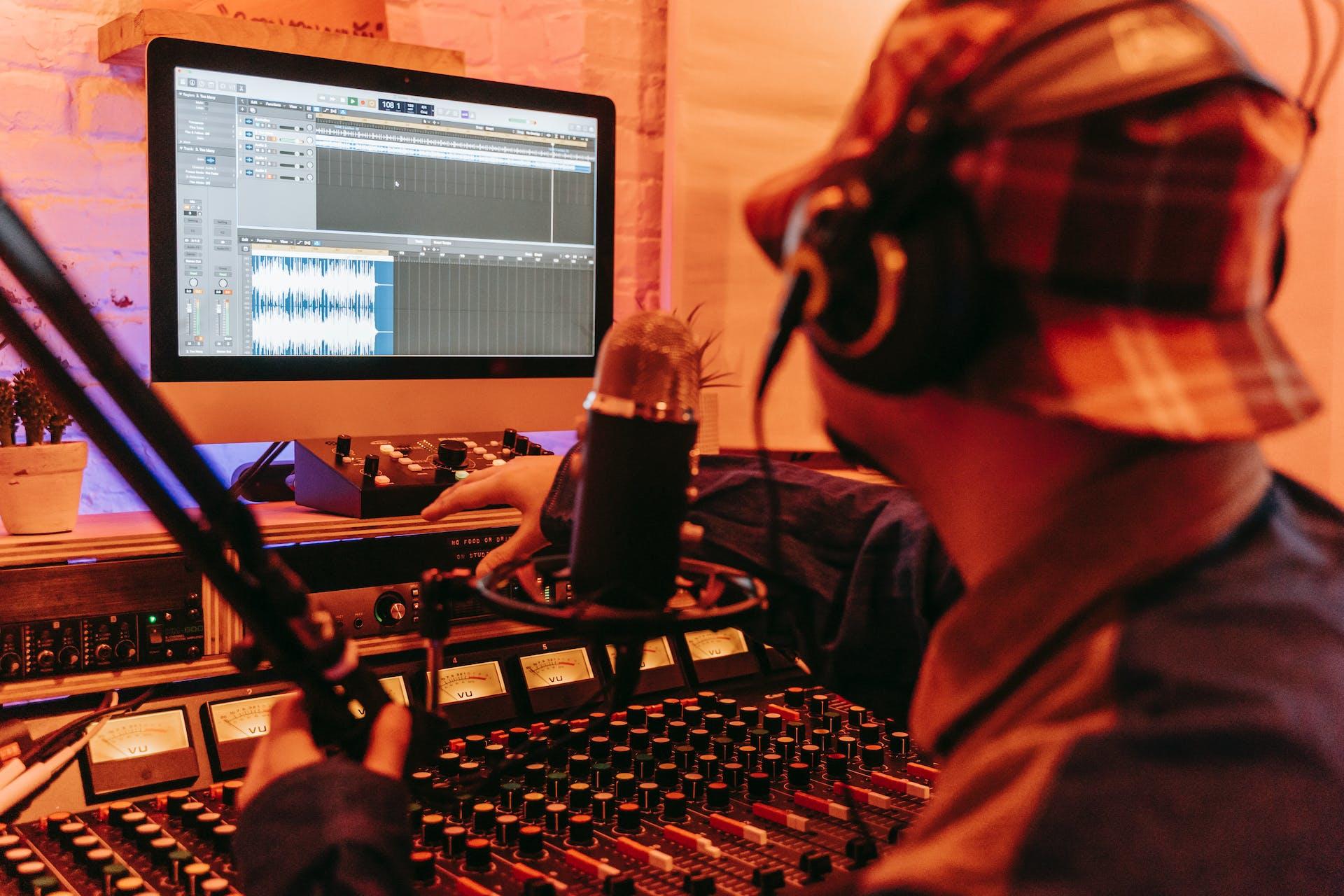Whether you dream of crafting chart-topping beats or producing groundbreaking albums, breaking into the music production business requires a combination of talent, hard work, and industry knowledge.
This article is your guide to the essential steps to becoming a music producer. From honing your technical skills to building a professional network, we'll discuss practical tips to help you navigate this competitive industry.
Discover how to choose the right music production software and learn the techniques used by industry professionals to polish their tracks. Find out about the importance of developing a unique style and carving your niche in the vast world of music production.
With the right tools and knowledge, you can turn your passion for music into a successful career!

What Does Music Production Entail?
In short, a music producer is the person responsible for taking an idea for a song from the conception stage to the final draft, making it sound like the musical artist envisioned through a series of technical and artistic processes.
Music producers go through the seven major steps in music production:
- Conceptualization and Composition
- Pre-Production
- Recording (Production)
- Post-Production
- Mixing
- Mastering
- Distribution
Here’s what an average project might entail for a music producer:
- Work with musical artists to create a concept for a song and/or album
- Help make musical arrangements, instrumentation, vocals, and more to achieve the desired atmosphere
- Record and re-record in the studio, experimenting with early versions of the song(s)
- Mix and master (or manage mixers and masters) song(s) to perfection
- Work with outside companies for manufacturing of CDs and included materials, marketing materials, graphic design, advertising, and more
- Ensure the artist’s vision is honored and brought to life in a practical way
It’s a lot of hard work, long hours, and repetitive listening when you’re in the depths of mixing and mastering, but for people who love music, there’s nowhere else they’d rather be!
Some producers who are part of a team may only handle certain aspects, while others might handle the entire process from idea to launch and even beyond.
Most music producers have at least an associate's degree and many have a bachelor's degree in a music-related field. But, it's not a strict requirement.
Prepare for a Career in Music Production
Before you can think about starting a music production company of your own, you’ll need to learn certain skills and gain experience in the field.
Become Educated in Music
If you want to and have the means to, you can seek a music management degree, a music business degree, or other education like an audio engineering degree, audio production degree, music degree, or music technology degree.
While it can be beneficial to attend a music producer course or college program for audio engineering and/or music production, you don’t necessarily need to go to a formal program to learn everything you need.
It might be a lot more challenging to learn on your own and you won’t have a degree to show for it, but many people are self-taught music producers.
If you learn the skills and build an impressive portfolio, you may also have a shot at the big leagues!
Make sure you learn music theory, composition, instrumentation, sound design, the history of music, and about the music production industry. You also need to be familiar with the modern landscape of music styles and genres as well as standard production techniques and currently favored types of mixings.
You’ll need to know the basics of how to produce a song before you step foot in a recording studio.

Practice Musical Techniques
Even if you don’t want to be the one making the raw music, you still need to be familiar with the process. You should have an understanding of vocals and at least a few instruments, superb ear training, and a general aptitude for understanding music.
Acquire Your Gear and Learn Even More
Get hands-on experience by researching the equipment you need to a) understand the industry standard processes and b) be able to make the type of music you want to make.
Learn everything you can with your equipment and make samples for your audio portfolio.
Some equipment you might want to acquire includes a mixer, MIDI controller, studio monitors, headphones, a microphone with attachments like a pop-filter, and a quality computer with a powerful processor.
Familiarize yourself with DAW (Digital Audio Workstation) software like Ableton Live, FL Studio, Logic Pro, Audacity, and Adobe Audition; you’ll need tools like these for creating, editing, and producing music in your career!

Break into the Music Production Biz
So how can you get from learning about the music production business to working in it?
It’s a simple process, even if it’s not exactly easy.
Build Your Portfolio
As mentioned before, you must build a substantial portfolio that demonstrates your technical knowledge, creative artistry, musical talent, and industry know-how.
Many aspiring music producers start by producing their own music or that of a friend. You may even find that you produce and release your own music for a while before moving on to working for others (or perhaps you can continue producing for yourself for your entire career!) Just look at artists like Billie Eilish, Mac DeMarco, Trent Reznor, Chance the Rapper, and Grimes.

Network and Collaborate
Next, you have to build your network. Connect with other musicians, producers, and industry professionals. You can attend local events, join online forums, and use social media platforms to network. Collaborating with others can open doors and provide valuable learning experiences.
Connecting with small-time artists and producers at your same level is a great way to build a supportive group, and if/when one of you makes strides, you may be able to open doors for each other!
Internships and Assisting Positions
Apply to internships or volunteer your spare time as an assistant to someone local or online in the music industry. Also look for entry-level positions at recording studios, production houses, or record labels. You can learn more about the ins and outs of different aspects of the field and network even more. Your role can turn into a permanent position or you can get linked up with someone who can hire you for your services!
Make Yourself Unforgettable
In the entertainment world, a lot of opportunities come from people who promote and advocate for themselves constantly. Always have business cards on hand (make business cards), have a personal website to showcase your portfolio, current projects, collaborations, and work experience, and demonstrate your immersion in the music industry.
If you’ve produced your own music, see if you can get it added to Spotify playlists, YouTube playlists, or even on a radio station!
How to Start a Music Production Company
Want to start your own music producer business rather than work for someone else?
While it’s unlikely you’ll become a well-known name in the industry at large (at least, not for the first 10 years of operation or so), you can still find success and creative fulfillment as an indie producer!
There are countless musical artists out there who need a small-time producer, and your stylings and personality are bound to be the perfect match for a healthy handful of them, meaning you can create beautiful music together.
So, how can you get your career as a song producer off the ground?
Think: Breaking Into the Biz, Again
Utilize all the same techniques mentioned above to get started. You’ll need experience and connections both for credentials and for your personal evolution. How can you expect to work within the music industry if you don’t have any first-hand experience with interpersonal interactions, financial dealings, collaborations, and other details of how the community works?
Build a Production Portfolio
Your production portfolio needs to appeal to artists, rather than producers. You’re not trying to be a production intern, you’re trying to be the producer.
Show how you style your own music as well as friends and any other projects you’ve worked on. Demonstrate your specialties and range of skills. You can include original compositions, remixes, and collabs.
You can also carve your space into a niche or make your own to make sure you attract the type of artists and genres you want to produce.
Collaborate with Other Musical Artists
Never stop working with others! Being in the music industry relies heavily on being part of a community, so tour with others, play live with others, have a jam sesh with others, come up with marketing materials with others, promote others, produce with others, and never stop working on your interpersonal skills.
Put Yourself Out There
Remember: Hype yourself up; promote yourself with your business cards, portfolio, website, collab credits, and actions.
Actively seek out projects to make connections while adding to your portfolio and honing your skills. Consider freelancing as a music producer. Platforms like SoundBetter and Upwork connect producers with artists looking for professional production services.
Make a social media array for your production business: Instagram, Facebook, TikTok, YouTube, SoundCloud, the works. Advertise your services, your personality, and your knowledge by combining posts/reels/videos showing your work, your creative process, and aspects of your life in the music industry.
Approach others at every opportunity; you will experience rejection a lot, but that’s not a bad thing! We often think that being rejected means we failed, but it actually just means that we asked about an opportunity and it wasn’t for us, that’s all!
You also need to ask for and be open to constructive criticism and feedback without getting too defensive; sometimes people give unhelpful (and even hurtful) advice, but other times there is insightful advice that we need to hear to improve in our work and life.
Have resilience, be secure in your knowledge and skills, and surround yourself with support. Even in the face of setbacks and challenges, remember that art doesn’t come without blood, sweat, and tears! It’s all part of the process.
Learn About Various Legal Structures
Choose a style of legal structure and get your company registered as an LLC, sole proprietorship, partnership, or corporation.
Register your business’s name with the proper government authority, and obtain the proper operating permits, such as a business license. And, make sure you get a Tax Identification Number (TIN) if needed!
Make sure to always register trademarks, copyrights, and research about licensing to properly protect your intellectual property (IP). Also, be sure you understand these things to avoid violating others' IP protections!
Have a professional lawyer provide solid contract templates for your employees and clients to make sure everyone is aware of the details of your professional and legal relationship.
I've experienced tons of failure. I've been making music for 30 years, and I'd say failure and success have happened in equal measure.
Moby
Stay Relevant in the Music Industry
One of the worst mistakes someone can make in any industry is to not keep up with new technological advances and trends. You can choose to keep doing things old school after you learn about it, but you simply must know current industry standards.
If you’re ignorant of a new musical style or tech, at best you will struggle in conversations regarding these things, and at worst you’ll lose credibility with your clients and peers and be unable to keep up with the competition.
Additionally, you’ll need to ensure your business model, advertising and marketing, and other aspects of your business remain coherent, confident, and timely. Know what you and your business are about and be proud of the culture you help create!
Being flaky or timid in your business persona can make you, your employees or business partners, and your clients lose faith. If you need a business coach to assist you in strengthening your enterprise, seek one out; don’t let yourself flounder and fail because you didn’t ask for help!
Discover the harmony of learning with our engaging online classes for music. Explore a diverse range of musical genres, techniques, and theory from the convenience of your own home. Whether you're a beginner or an experienced musician, our expert instructors will help you unlock your musical potential and cultivate your passion for music. Join our virtual community of music enthusiasts today and embark on a transformative journey of musical discovery!

Getting Into the the World of Music
When getting ready for jobs in the music business worldwide or domestically, you need to be experienced. If you don’t have formal education, you can still learn a lot on your own or with a music producer course or music producer lessons from someone in the know, like a private professional tutor on Superprof!
Seeking out a coach to help you learn the basics or dive deep into the technical aspects of a niche concept can help you boost your creativity, skills, and knowledge to new heights. A music production course, with a certificated coach can even help you come up with things like business plans, project proposals, monetary grant requests for new equipment, and more.
No matter what your journey into the world of music jobs looks like, have confidence, remain open to new ideas, and work hard; your effort can pay off in unimaginable and fantastic ways!
Summarize with AI:















Please send some information to my emai